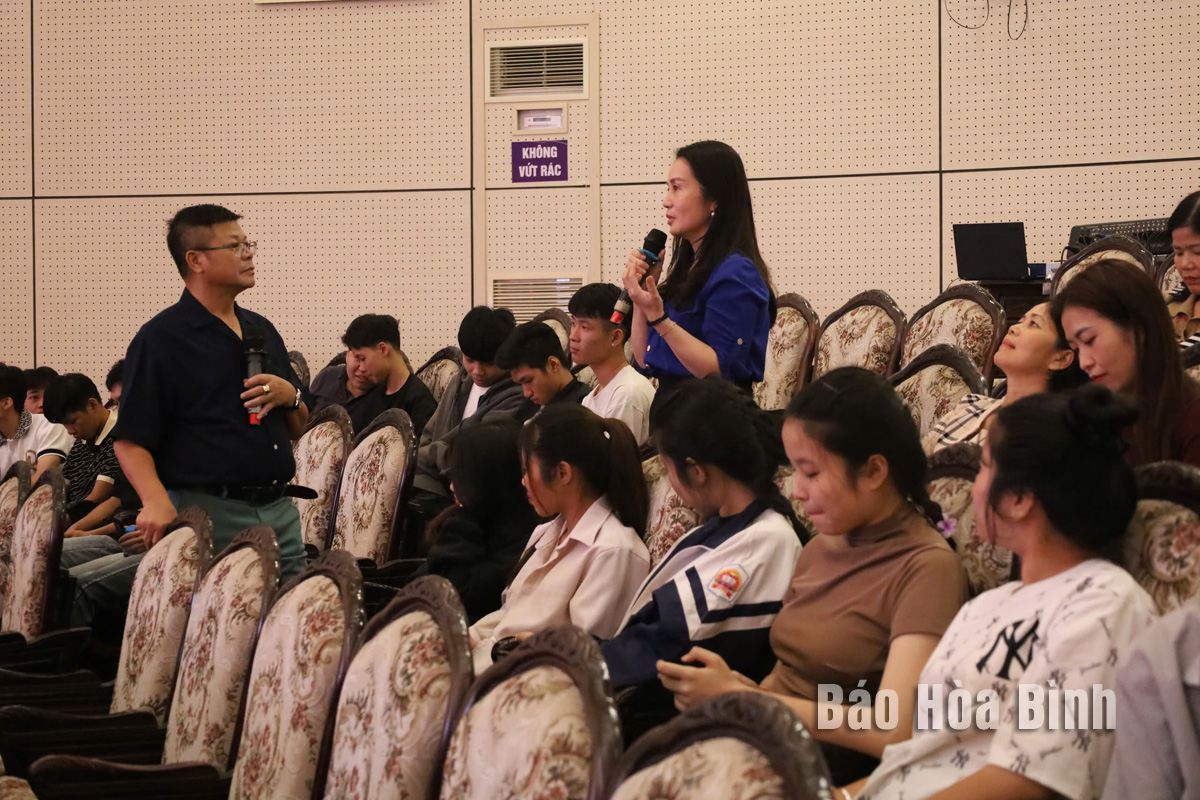
The Board for Women's Advancement of Hoa Binh province on November 11 officially launched the Action Month for Gender Equality, focusing on preventing and addressing gender-based violence. As part of the event, a special talk was held on the theme of sharing household work for a happy family. The event drew 300 delegates, including Nguyen Van Toan, Standing Vice Chairman of the provincial People's Committee and head of the provincial Board for Women's Advancement.

Speaker Dinh Doan
talks with participants.
This year’s action month seeks measures to ensure social
welfare, empower women and girls, and create opportunities to achieve gender
equality and eliminate gender-based violence.
After more than a decade implementing the Gender Equality
Law, gender equality work in Hoa Binh has received continuous attention and
support from the provincial Party Committee, People's Council, and People's
Committee, as well as the active involvement and responsibility of local
departments, agencies, and organisations at all levels, contributing to achieving
the targets set out in the National Gender Equality Strategy for the 2021-2030
period in Hoa Binh.
Speaking at the event, Toan emphasised that women are
increasingly participating in all aspects of social life and gradually
asserting their prominent roles across various fields. He highlighted the
action month as a peak period to intensify communications on gender equality,
and urged everyone to speak out and take action to end violence against women
and children.
To better gender equality work in the coming years, he urged
leaders of local Party Committees and authorities to strengthen their in
promoting gender equality and women's advancement; step up disseminations on
the Party’s resolutions, the State’s policies and laws, and the province’s
regulations related to this issue; and intensify efforts to prevent and combat
gender-based violence and work toward ending violence against women and
children.
On this occasion, Dr. Dinh Doan, a renowned psychologist,
had a talk on the topic of sharing household work for a happy family, during
which he shared valuable knowledge and tips on maintaining family happiness,
fostering connections, and promoting the responsibility and role of each member
in building a peaceful home while saying "no" to violence.
More than just an information technology teacher, Bui Van Nien is an inspiring figure who has nurtured the scientific curiosity and creative spirit of students in Vietnam’s ethnic minority communities.
Da Bac is the most disadvantaged mountainous district in Hoa Binh province, with ethnic minorities accounting for about 90% of its population. Over the past years, the district has mobilised resources to implement ethnic policies to improve the quality of life of local people.
In recent years, Hoa Binh province has consistently prioritised the protection, care, and education of children, particularly those from ethnic minorities and disadvantaged backgrounds, by creating a safe, healthy, and nurturing environment for their all-round development.
The Steering Committee for Tobacco Harm Prevention and Control of Hoa Binh province, in coordination with the Tobacco Harm Prevention and Control Fund, held a ceremony on May 28 in response to the World No Tobacco Day (May 31) and the National No Tobacco Week (from May 25 to 31). The event was chaired by Nguyen Van Toan, Standing Vice Chairman of the provincial People’s Committee and head of the Steering Committee.
Since 2021, the Center for Industrial Promotion and Industrial Development Consulting (CIIDC) under the Department of Industry and Trade has been implementing a school lighting model as part of the plan for using energy efficiently and economically in Hoa Binh Province in the pẻiod of 2021 - 2025. This model not only aims to improve the learning conditions and enhance the education quality, but it also promotes the message of energy saving, energy security, environmental protection and contributes to the goals of socio-economic development.
In the 2024 - 2025 school year, the entire Hoa Binh provincial education sector includes 520 educational institutions and schools. Among them are 13 ethnic boarding schools with 153 classes and 4,487 students. Four of these schools have met national standards, reaching 30.7 percent.



